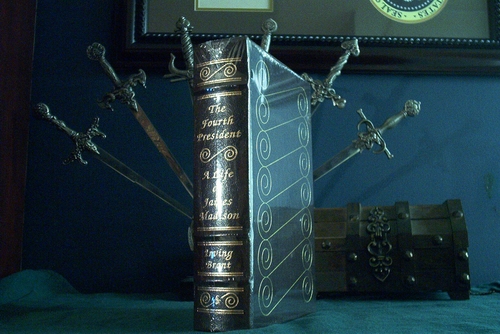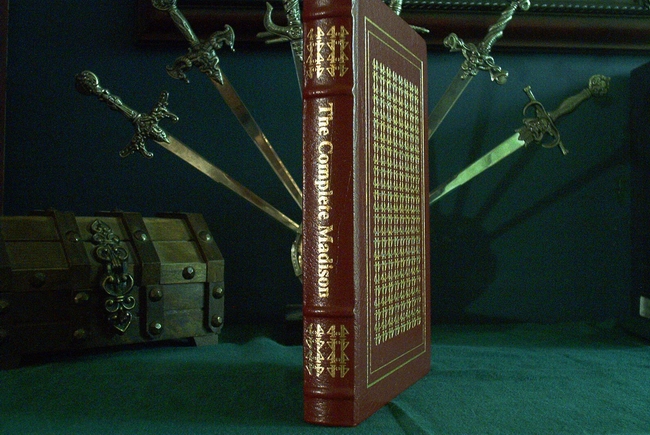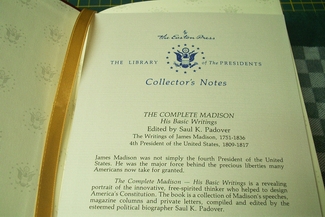Easton Press James Madison books
The Federalist - 100 Greatest Books Ever Written - 1979
The Fourth President: A Life of James Madison - Irving Brant - 1985
The Complete Madison: His Basic Writings - 1988
Franklin Library James Madison books
The Federalist - 100 Greatest books of all time - 1977
The Federalist - 100 Greatest masterpieces of American Literature - 1980
The Federalist - Great Books of the Western World - 1980
President James Madison biography
James Madison (1751-1836), American statesman, called the father of the Constitution, fourth President of the United States, born in Port Conway, Virginia, and educated at the College of New Jersey (now Princeton University). He early became one of the leading exponents of the independence of the American colonies, and in 1776, upon the outbreak of the American Revolution, was elected a member of the convention which drew up the Virginia Constitution. He made a notable contribution to that document in the form of a clause allowing for the free exercise of religion, one of the earliest provisions for religious freedom in American law. In 1870 he was elected a delegate to the Continental Congress, in which during the ensuing three years he distinguished himself by his firm advocacy of the establishment of a central government. Elected a member of the Virginia delegation to the Constitutional Convention in Philadelphia in 1787, James Madison drew up an outline for a proposal Constitution which expanded into the Virginia Plan, was submitted to the Convention. Among the features of this plan later incorporated into the United States Constitution were the concept of a balanced system of government in which the national authority would be limited by the reservation of certain powers to the local governments and to the people; the creation of a national chief executive (later the office of the President); and the establishment of a bicameral national legislature endowed with certain coercive powers. The adoption of these and other provisions of James Madison's plan earned for him the title "father of the Constitution"
After the submission of the Constitution to the States for ratification, James Madison collaborated with Alexander Hamilton and John Jay in the writing of a series of papers, published between 1778 and 1788 under the title The Federalist, setting forth the need for a strong central government as proposed in the new Constitution, and urging its ratification. In 1789, the votes necessary for ratification having been cast, James Madison was elected a Virginia delegate to the first session of the United States House of Representatives, in which he served until 1797. In the conflict which subsequently developed between Thomas Jefferson, then secretary of state, and Hamilton, then secretary of treasury, over the question of increasing authority of the national government, James Madison sided with Jefferson, viewing the Hamiltonian proposals for strengthening the central authority as a threat to the democratic rights of people. Thus James Madison, previously a leading advocate of centralization of governmental power, recognized the dangers of too much centralization, and urged the placing of certain limitations on Federal authority in the interest of States' rights. Madison and Jefferson organized and became leaders of the Democratic-Republican Party, which became the major force opposing the Federalist Party led by Hamilton. In 1798, following the enactment by the Federalists-dominated Congress of the Alien and Sedition Acts, James Madison collaborated with Jefferson in drafting the Virginia Resolutions, denouncing the new laws as a violation of civil liberties and upholding the right of the States to interfere with any unjust and unconstitutional exercise of power by the Federal government.
The policies of the Federalists were finally repudiated by the electorate in 1801; Jefferson was elected President, and appointed James Madison secretary of state. During the ensuing eight years Madison was faced with the increasingly serious problem of the seizure of American vessels and the imprisonment of American seamen by England and France, then engaged in war. By 1809, when James Madison was elected President, the problem had become acute; nevertheless, President James Madison attempted for three additional years to solve it through diplomatic negotiations, and only agreed to a declaration of war in June, 1812, after all peaceful measures had been exhausted. The War of 1812 was concluded in 1814 by the signing of the Treaty of Ghent, and three years later President James Madison retired from the Presidency. Subsequently he was relatively inactive in politics; the only notable public position he held was that of rector of the University of Virginia, in which capacity he served from 1826 until his death.
The Fourth President: A Life of James Madison
The Fourth President by Irving Brant is a comprehensive and illuminating biography of one of America's founding fathers. Brant, a renowned historian, delves deep into the life and times of James Madison, providing readers with a vivid portrait of this influential figure and his pivotal role in shaping the American nation.
Born on March 16, 1751, in Port Conway, Virginia, James Madison emerged as a leading voice for American independence and republican government during the Revolutionary era. His contributions to the drafting of the United States Constitution and his pivotal role in advocating for the Bill of Rights solidified his place in American history as a champion of liberty and constitutional principles. As the fourth President of the United States, Madison faced numerous challenges, including the War of 1812 and the ongoing struggle to define the role of the federal government. Brant's biography offers readers a nuanced understanding of Madison's presidency, exploring his successes, failures, and enduring impact on American governance.
Through meticulous research and engaging prose, Brant paints a vivid portrait of Madison, capturing his intellect, integrity, and unwavering commitment to the principles of liberty and democracy. From his early years in Virginia to his final days at Montpelier, Madison's life is brought to life in this definitive biography, offering readers a deeper appreciation for the man who played a central role in shaping the American republic.
The Complete Madison: His Basic Writings
The Complete Madison provides a comprehensive insight into the life and intellect of James Madison, one of the United States' most influential founding fathers. Edited by Saul K. Padover, this anthology compiles Madison's essential writings, spanning his prolific career as a statesman, philosopher, and architect of American democracy.
Born on March 16, 1751, in Port Conway, Virginia, Madison's early experiences in colonial America profoundly shaped his political philosophy. His advocacy for individual liberties and his steadfast commitment to the principles of republican government were evident throughout his life. As a delegate to the Constitutional Convention in 1787, Madison played a crucial role in drafting the United States Constitution, earning him the title "Father of the Constitution." His contributions continued with the publication of the Federalist Papers, co-authored with Alexander Hamilton and John Jay, which provided a compelling defense of the proposed Constitution.
Madison's influence extended beyond the Constitutional Convention. As a member of the first Congress, he championed the Bill of Rights, ensuring that fundamental freedoms were enshrined in the nation's foundational documents. Serving as the fourth President of the United States from 1809 to 1817, Madison navigated the challenges of the War of 1812 and worked tirelessly to preserve the young republic. The Complete Madiso" offers readers a comprehensive collection of Madison's writings, including his speeches, essays, letters, and public addresses. Through these primary sources, readers gain a deeper understanding of Madison's political thought, his vision for the United States, and his enduring legacy as a champion of liberty and democratic governance.
Padover's anthology is an essential resource for scholars, students, and anyone interested in exploring the ideas and ideals of James Madison, illuminating the enduring relevance of his contributions to American political thought.
James Madison quotes
"If men were angels, no government would be necessary."
"The advancement and diffusion of knowledge is the only guardian of true liberty."
"The truth is that all men having power ought to be mistrusted."
"The means of defense against foreign danger historically have become the instruments of tyranny at home."
"A well-instructed people alone can be permanently a free people."
"The essence of Government is power; and power, lodged as it must be in human hands, will ever be liable to abuse."
"The accumulation of all powers, legislative, executive, and judiciary, in the same hands, whether of one, a few, or many, and whether hereditary, self-appointed, or elective, may justly be pronounced the very definition of tyranny."
"The diversity in the faculties of men, from which the rights of property originate, is not less an insuperable obstacle to an uniformity of interests. The protection of these faculties is the first object of government."







Comments
Post a Comment
Share your best book review and recommendation